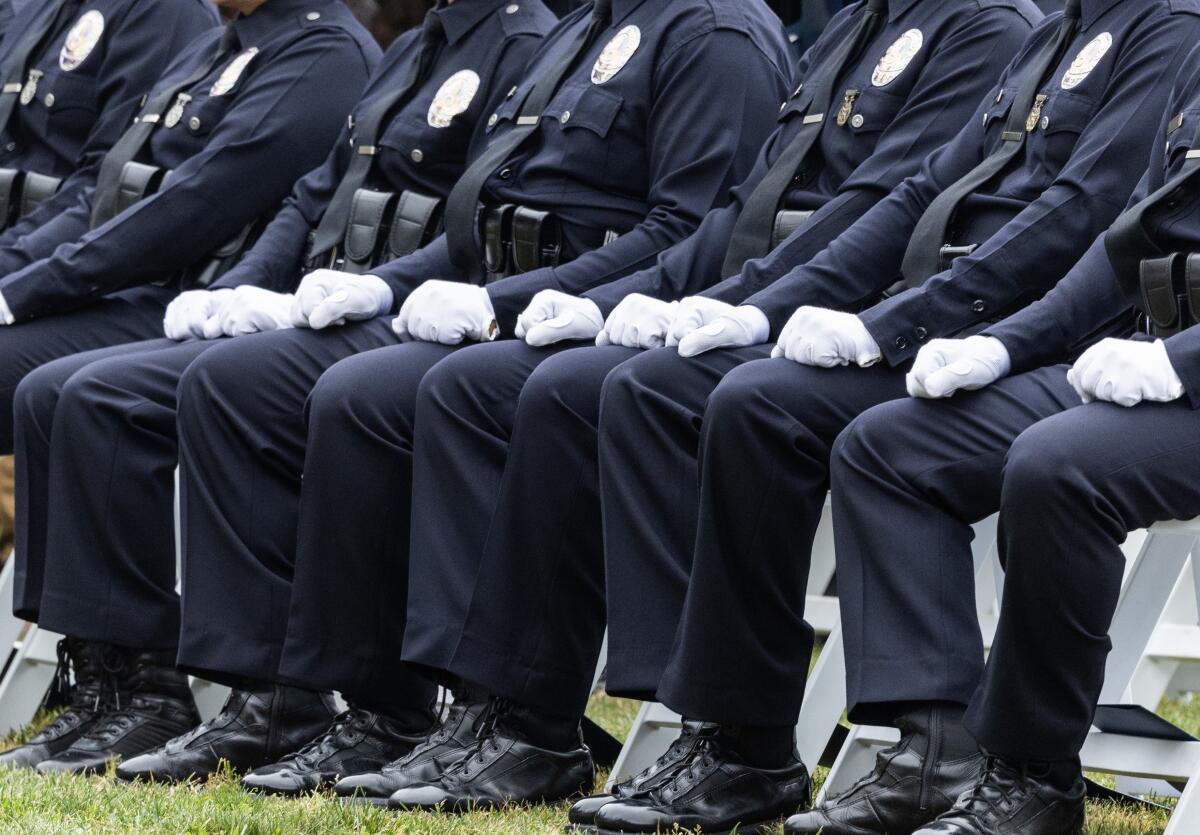Police officers won’t be forced to disclose their gender identity to state officials following lawsuit

- Share via
Police officers will no longer be required to disclose their own gender identity when they report details of traffic stops to the state in an effort to end a lawsuit over the issue.
Sacramento County Superior Court Judge Christopher Krueger last week approved a permanent injunction barring California Atty. Gen. Rob Bonta’s office from requiring the information, which was first reported by the San Francisco Chronicle.
Bonta’s office did not contest evidence submitted by the police organizations who filed suit earlier this year alleging the disclosure rules violated their privacy rights under state law. The agency wrote in a court filing in April that it continues to dispute plaintiffs’ claims; however, the group wanted to resolve the case. Bonta’s office did not provide additional comment Tuesday, saying instead that it would “let the settlement speak for itself.”
Murrieta Valley board defies California, will keep policy to tell parents about LGBTQ+ transitioning
State officials had ordered the district to drop its parent-notification policy — and administrators were going to comply — but the school board is rebelling.
At the heart of the issue is recently enacted regulations under the Racial and Identity Profiling Act, a state law passed in 2015 that requires California police officers to document information about people they encounter during situations such as traffic stops and submit that data to the state.
In January, new regulations required officers to identify their own gender identity to their employers, who would then relay that information to the state anti-discrimination board. The information is then compiled into annual reports with the goal of identifying and reducing racial profiling and other types of bias.
The new rule received swift pushback from law enforcement organizations.
Two weeks after the requirement took effect, the Peace Officers Research Assn. of California, the California Assn. of Highway Patrolmen, California Police Chiefs Assn. and the California State Sheriffs Assn. filed a lawsuit challenging it. The associations argued in court filings that the regulation violated employees’ civil rights and state and federal laws that grant the right to privacy, including the right to not disclose your gender identity.
“While the RIPA regulations ensure that this data is anonymized by the time it is viewed by the DOJ and the public, there is nothing to protect officers from review by their employers,” the groups wrote in court filings. “This forced disclosure violates officers’ right to privacy in their gender identity and directly conflicts with the DOJ’s recent public assurances that individuals have the right to disclose, or not disclose, their gender identity on their own terms.”
California courts will uphold, overturn or set ground rules for culture war battles in school districts over parent notification, book restrictions and even public records.
The law enforcement organizations pointed out in legal filings that Bonta has made it clear in other instances that forced gender identity disclosure policies violate state law. Earlier this year, Bonta told school officials in a statewide legal alert that “forced gender identity disclosure policies violate the California Constitution and state laws safeguarding students’ civil rights.”
In late January, Krueger issued a temporary restraining order blocking the requirement that police disclose their gender identity. This month’s ruling made that permanent.
“PORAC remains committed to protecting the rights of all our members to live as they wish, identify as they see fit, and to share that identity on their own terms,” Peace Officers Research Assn. of California President Brian R. Marvel said in a prepared statement in late January. “It is not fair or right to put officers in the untenable position of disclosing their gender identity before they are ready to do so and as a condition of employment.”
More to Read
Sign up for Essential California
The most important California stories and recommendations in your inbox every morning.
You may occasionally receive promotional content from the Los Angeles Times.













